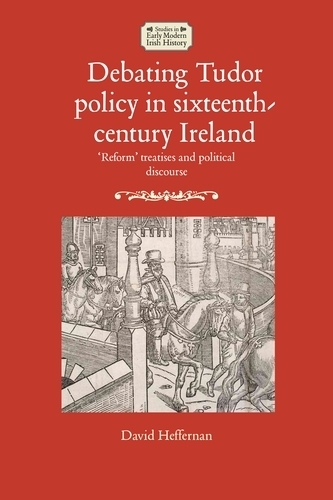
Debating Tudor Policy in Sixteenth-Century Ireland: 'Reform' Treatises and Political Discourse
(Hardback)
Publishing Details
Debating Tudor Policy in Sixteenth-Century Ireland: 'Reform' Treatises and Political Discourse
By (Author) David Heffernan
Manchester University Press
Manchester University Press
14th March 2018
United Kingdom
Classifications
Physical Properties
Hardback
272
Width 156mm, Height 234mm
Description
Ireland was conquered and gradually colonized by the Tudors during the sixteenth century. This much is clear but whether or not this was the actual goal of English policy in Ireland at that time has long been debated by historians. Debating Tudor policy in sixteenth-century Ireland examines a set of sources which provide a unique insight into English rule in Tudor Ireland. These are policy papers or treatises written at the time on how to 'reform' Ireland and bring it under greater crown control. The study constitutes the first systematic study of the approximately six-hundred such treatises to have survived. In doing so it sheds light on how the Tudors arrived at the policies they decided to implement in Ireland and examines how English officials and other parties within Ireland viewed the Irish and the country at that time. -- .
Reviews
From 1485 to 1603, Ireland drew from the Tudor court myriad schemes embodied in "reform" treatises, but this comprehensive examination challenges previous assumptions of Tudor inconsistency. Heffernan (Queen's Univ., Belfast) believes that intentions to extend the Pale (English territory in Ireland) and royal authority at the expense of the Irish lords marked the treatises; however, the means by which this would be accomplished was heavily debated. The acts of Edward Poynings signaled the end of a lengthy period of the crowns neglect, but the Henrician policy of "surrender and regrant" in the wake of the unsuccessful Kildare Rebellion (153435) provided the stamp for future "reform" treatises. As Heffernan explains, the possession of the Tudor charter provided no security. Regional conquest and the extension of the Pale proceeded by fits and leaps. By mid-century, the forging of a network of garrisons and the implementation of the plantation system allowed further immigration from England, much of it Protestant, which challenged the authority and culture of the Gaelicized constituents of the Pale. The resultant Desmond Rebellions (156973; 157983), followed by the scorched-earth suppression, led to a plethora of treatises implicating militarization, but little change in policy. Subjugation and settlement remained the Tudor intent.
S. L. Smith, California State University, Fullerton, Choice
Summing Up: Recommended. Advanced undergraduates through faculty and professionals
Author Bio
David Heffernan is an R. J. Hunter Postdoctoral Research Fellow at Queens University, Belfast
